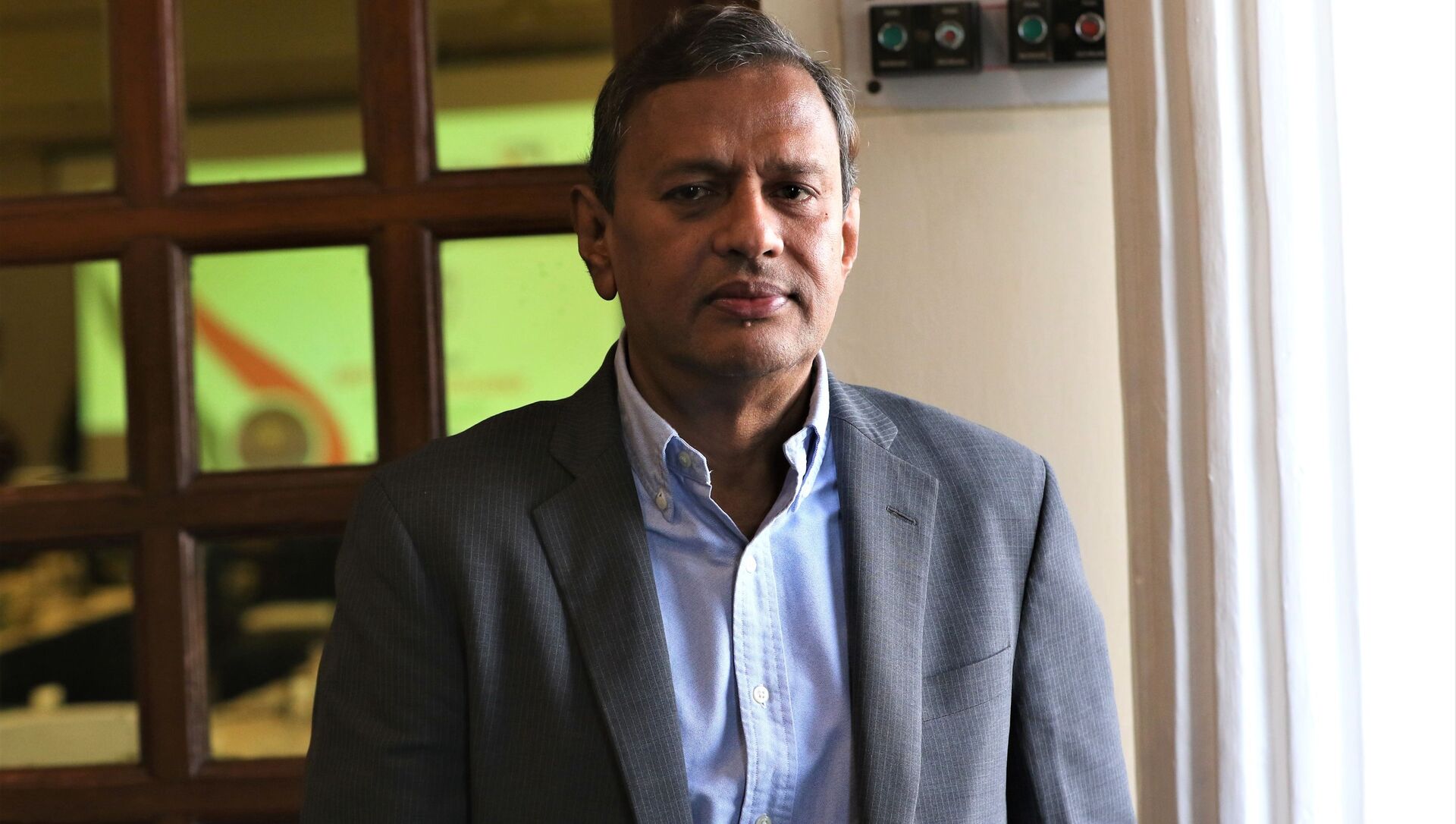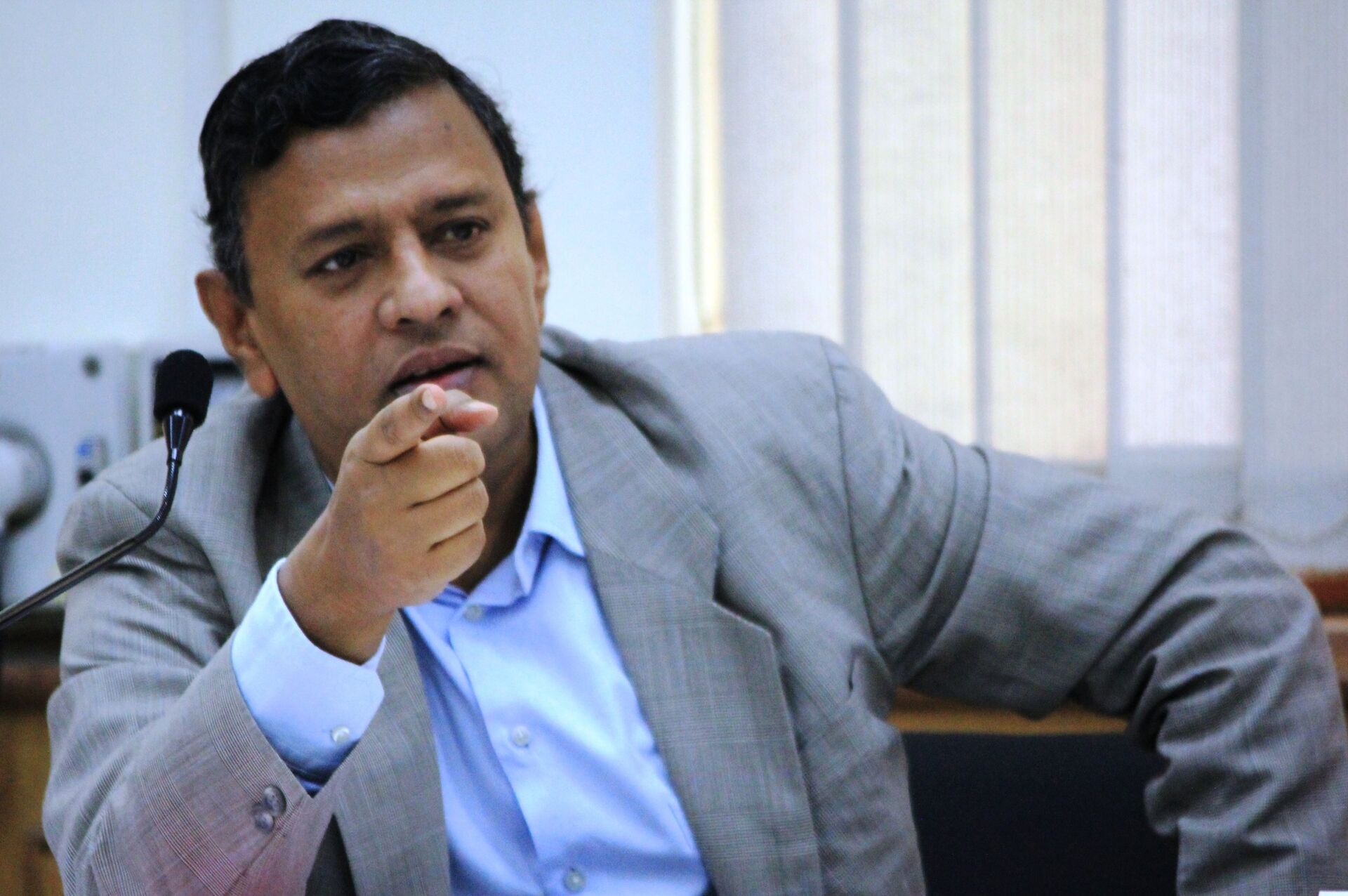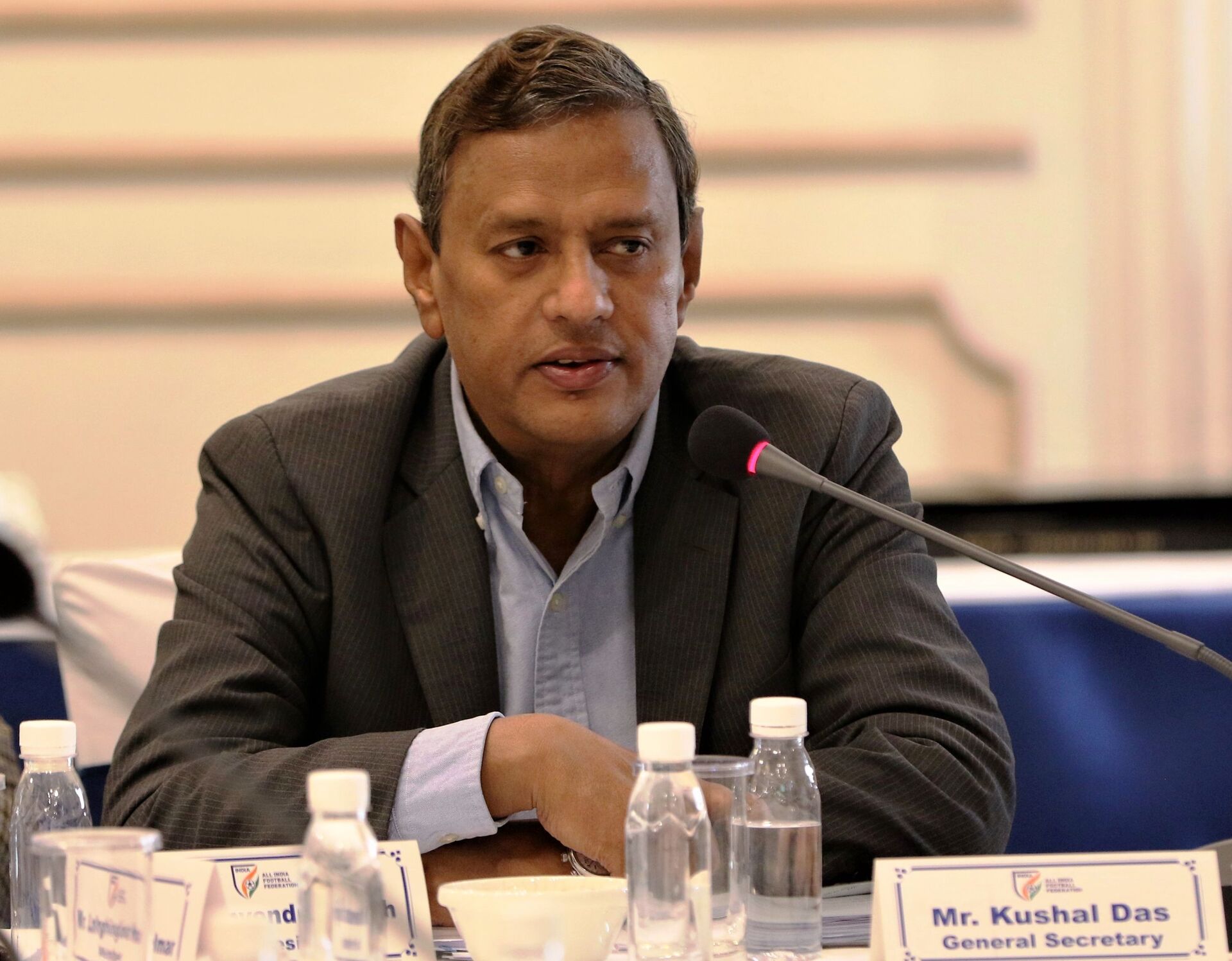https://sputnikglobe.com/20210831/2022-will-be-a-huge-year-for-womens-football-in-india-says-aiff-general-secretary-kushal-das-1083757395.html
2022 Will be a Huge Year for Women's Football in India, Says AIFF General Secretary Kushal Das
2022 Will be a Huge Year for Women's Football in India, Says AIFF General Secretary Kushal Das
Sputnik International
Kushal Das, the general secretary of the All India Football Federation (AIFF), is known for his meticulous planning and bringing in revolutionary changes to... 31.08.2021, Sputnik International
2021-08-31T10:32+0000
2021-08-31T10:32+0000
2022-11-30T09:58+0000
newsfeed
sport
football
footballer
footballers
football club
ex-footballer
football team
football fans
football star
https://cdn1.img.sputnikglobe.com/img/07e5/08/1f/1083758114_0:61:3072:1799_1920x0_80_0_0_3808434ce85734f2324cdec6dc68454a.jpg
The year 2022 could change the face of women's football in India as the South Asian nation will play host to the AFC Women's Asian Cup and the FIFA U-17 Women's World Cup next year, says the All India Football Federation's (AIFF) General Secretary Kushal Das. In an interview with Sputnik, Das also spoke about the impact of the Indian Super League (ISL) on football in the country, how the AIFF has succeeded in creating unbreakable bio-bubbles, and how he views the presence of Indian clubs in the AFC Champions League.Sputnik: What has been the secret of the AIFF's unbreachable bio-bubble, as no tournament organised by the AIFF has been cancelled since competitions resumed with the I-league Qualifiers last October? Kushal Das: Indian football takes immense pride in leading from the front to bring back live sporting action in India while following the required protocols putting the safety of our athletes first.It was Indian football which first executed the concept of a bio-bubble with the I-League qualifiers, as a result of which the model was stamped as a standard, and followed by others as well. Thereafter, Indian football successfully executed the bubble for the Hero ISL, the Hero I-League, and the recently concluded AFC Champions League in Goa (state).We banked on our regular meticulous planning and the federation’s self-belief in match operational activities. When we ventured out there was scepticism all around, and it was challenging. There could have been no compromises with the safety of the players and support staff along with the operational staff.Indian football understands the significance of the bubble, and we have been able to strike a chord with the players, assuring them of their safety. That's what motivates us. We have preferred to go into the microscopic detail of every plan to manage it at the macro level.Not to forget that our U-16 national team, the women's senior national team and the men's senior national team have also played international friendlies and the AFC qualifiers abroad, all under the bubble protocol successfully.Sputnik: India is not in contention to qualify for the FIFA World Cup. Are you optimistic about India securing an entry into the 2023 Asian Cup?Kushal Das: We were drawn in a group that had Asian Champions Qatar and a strong Oman. Our target from the group was to finish third and had we not lost our concentration in those last 10 minutes against Oman in Guwahati (city), things could have been different. But that's football. But you also need to remember that we held Qatar in our away match.At the moment, we are on course for qualification in the AFC Asian Cup to be held in China in 2023 – that's the next aim. The AIFF has laid down a robust calendar for the Blue Tigers which will allow them sufficient international match timing ahead of the qualifiers. The domestic season is also to kick-off soon and all the players will be in prime shape as and when the qualifiers kick-off.Sputnik: How did the launch of the Indian Super League (ISL) change the landscape of Indian football?Kushal Das: The game has reached every nook and corner of the country, with Indian football being live on prime time television. It has generated huge interest among the masses and drawn new fans to watch and follow Indian football.The development of infrastructure is another aspect that has changed the paradigm of hosting mega football events in the country. India is now a go-to destination for FIFA and AFC, and all of that couldn't have been possible with the snazzy infrastructure, which is an integral part of Indian football nowadays. You also need to look at the quality of the playing turfs all over – it's soft and lush.You also need to look at the corporate interest which the ISL has generated. The AIFF has gauged this interest over Indian football for long and now there are so many big corporate houses that are an integral part of the Indian football family.Football in India is pan-India at the moment – it's no more confined to the pockets. In the I-League, you have teams from Kashmir to Kerala to Chennai to Aizawl to Goa to Punjab to Bengal to Manipur to Delhi, besides the Indian Arrows. When was the I-League so diverse? The sociological revolution which Indian football has brought in Kashmir and Aizawl has been immense.Speaking about standards, the boys who have been outperforming others in the I-League today are the stars of tomorrow in the ISL, and eventually the national team.The federation has long been urging the respective clubs to follow and invest in their youth development model to increase the pipeline. Investing in the youth is a non-stop profit earner as you get to spread your wards all over. You need to look at the Indian Arrows to understand the magic that a youth development project can bring to a developing footballing nation.Sputnik: How do you plan to develop women's football in India?Kushal Das: We have laid a detailed plan for the U-18 girls in our attempt to qualify for the 2027 World Cup. The plan has been endorsed and supported by the Ministry of Sports and Sports Authority of India (SAI), for which we stay grateful. We want to carry this message to all girls who aspire to play the sport, that the football federation stands by them and wants to see them compete at the highest level.We are confident that the legacy that the FIFA U-17 World Cup in 2022 will leave behind will allow and inspire girls in India to play more. That in itself will mark a major shift in the paradigm of sporting culture in India, and the society overall.The AIFF has also been extremely serious in providing international exposure to the women's team and in fact, the women's team played 45 friendly matches at the international level since 2018, and then in 2020, the pandemic struck. But even then, the women's team did travel to play international matches in Turkey and then in Uzbekistan – that too in the midst of the pandemic to play five matches.There were a lot of exposure tours lined up for the women's team (in fact, for the youth teams too), but with the pandemic striking, the circumstances have been different. The quarantine rules lie with the governments of the respective countries and not just with any football federation. The safety of the players and officials is of paramount importance and there can never be any compromises in that regard.Thomas Dennerby has taken charge as the head coach of the senior women's team. The AIFF, in consultation with him and other stakeholders, has put in a composite calendar for the women's team which includes plans for international friendlies and also an international tournament in India.However, all of that is subject to materialisation in view of the current pandemic situation, which has restricted travel worldwide.The Indian Women's League (IWL) has also been a huge success, allowing a platform for aspiring players to display their skills.Sputnik: India is hosting the Women's U-17 FIFA World Cup in 2022. Do you think it will give a boost to women's football in India?Kushal Das: 2022 will be a huge year for women's football in India as we are playing host to the AFC Women's Asian Cup from January followed by the FIFA U-17 Women's World Cup slated for October 2022. The legacy of the two tournaments will surely galvanise the Indian sociological context and develop a huge interest among the girl child, allowing her to play more.Sputnik: How do you look at FC Goa being the first team from India to play in the AFC Champions League? Kushal Das: FC Goa put on a laudable performance despite being pitted in a group that had Persepolis FC, Al Wahda, and Al Rayyan. The standard of club football in India has improved by leaps and bounds in the last few years. We are no more mere pushovers, but are there to make a mark. It will only get better from here. I need to thank the Asian Football Confederation for their support and belief in Indian football.You also need to remember that Bengaluru FC was the first Indian club to play in an AFC Cup final. This year too, I am looking forward to the Indian challenge in the AFC Cup, which will be represented by ATK Mohun Bagan and Bengaluru FC.
Sputnik International
feedback@sputniknews.com
+74956456601
MIA „Rossiya Segodnya“
2021
Pawan Atri
https://cdn1.img.sputnikglobe.com/img/07e5/05/12/1082926219_0:0:358:358_100x100_80_0_0_aca1d9bdccc7af990e49b4511ee80344.png
Pawan Atri
https://cdn1.img.sputnikglobe.com/img/07e5/05/12/1082926219_0:0:358:358_100x100_80_0_0_aca1d9bdccc7af990e49b4511ee80344.png
News
en_EN
Sputnik International
feedback@sputniknews.com
+74956456601
MIA „Rossiya Segodnya“
Sputnik International
feedback@sputniknews.com
+74956456601
MIA „Rossiya Segodnya“
Pawan Atri
https://cdn1.img.sputnikglobe.com/img/07e5/05/12/1082926219_0:0:358:358_100x100_80_0_0_aca1d9bdccc7af990e49b4511ee80344.png
newsfeed, sport, football, footballer, footballers, football club, ex-footballer, football team, football fans, football star, football game, football chant, football match, football pitch, football player, football legend, bion, qualifiers, fifa world cup 2022, friendly, friendly game, friendly match, friendly match
newsfeed, sport, football, footballer, footballers, football club, ex-footballer, football team, football fans, football star, football game, football chant, football match, football pitch, football player, football legend, bion, qualifiers, fifa world cup 2022, friendly, friendly game, friendly match, friendly match
2022 Will be a Huge Year for Women's Football in India, Says AIFF General Secretary Kushal Das
10:32 GMT 31.08.2021 (Updated: 09:58 GMT 30.11.2022) Kushal Das, the general secretary of the All India Football Federation (AIFF), is known for his meticulous planning and bringing in revolutionary changes to Indian football during his tenure.
The year 2022 could change the face of women's football in India as the South Asian nation will play host to the AFC Women's Asian Cup and the
FIFA U-17 Women's World Cup next year, says the All India Football Federation's (AIFF) General Secretary Kushal Das.
In an interview with Sputnik, Das also spoke about the impact of the Indian Super League (ISL) on football in the country, how the AIFF has succeeded in creating unbreakable bio-bubbles, and how he views the presence of Indian clubs in the AFC Champions League.
Sputnik: What has been the secret of the AIFF's unbreachable bio-bubble, as no tournament organised by the AIFF has been cancelled since competitions resumed with the I-league Qualifiers last October?
Kushal Das: Indian football takes immense pride in leading from the front to bring back live sporting action in India while following the required protocols putting the safety of our athletes first.
It was Indian football which first executed the concept of a bio-bubble with the I-League qualifiers, as a result of which the model was stamped as a standard, and followed by others as well. Thereafter, Indian football successfully executed the bubble for the Hero ISL, the Hero I-League, and the recently concluded AFC Champions League in Goa (state).
We banked on our regular meticulous planning and the federation’s self-belief in match operational activities. When we ventured out there was scepticism all around, and it was challenging. There could have been no compromises with the safety of the players and support staff along with the operational staff.
Indian football understands the significance of the bubble, and we have been able to strike a chord with the players, assuring them of their safety. That's what motivates us. We have preferred to go into the microscopic detail of every plan to manage it at the macro level.
Not to forget that our U-16 national team, the women's senior national team and the
men's senior national team have also played international friendlies and the AFC qualifiers abroad, all under the bubble protocol successfully.
Sputnik: India is not in contention to qualify for the FIFA World Cup. Are you optimistic about India securing an entry into the 2023 Asian Cup?
Kushal Das: We were drawn in a group that had Asian Champions Qatar and a strong Oman. Our target from the group was to finish third and had we not lost our concentration in those last 10 minutes against Oman in Guwahati (city), things could have been different. But that's football. But you also need to remember that we held Qatar in our away match.
At the moment, we are on course for qualification in the AFC Asian Cup to be held in China in 2023 – that's the next aim. The AIFF has laid down a robust calendar for the Blue Tigers which will allow them sufficient international match timing ahead of the qualifiers. The domestic season is also to kick-off soon and all the players will be in prime shape as and when the qualifiers kick-off.
Sputnik: How did the launch of the Indian Super League (ISL) change the landscape of Indian football? Kushal Das: The game has reached every nook and corner of the country, with Indian football being live on prime time television. It has generated huge interest among the masses and drawn new fans to watch and follow Indian football.
The development of infrastructure is another aspect that has changed the paradigm of hosting mega football events in the country. India is now a go-to destination for FIFA and AFC, and all of that couldn't have been possible with the snazzy infrastructure, which is an integral part of Indian football nowadays. You also need to look at the quality of the playing turfs all over – it's soft and lush.
You also need to look at the corporate interest which the ISL has generated. The AIFF has gauged this interest over Indian football for long and now there are so many big corporate houses that are an integral part of the Indian football family.
Football in India is pan-India at the moment – it's no more confined to the pockets. In the I-League, you have teams from Kashmir to Kerala to Chennai to Aizawl to Goa to Punjab to Bengal to Manipur to Delhi, besides the Indian Arrows. When was the I-League so diverse? The sociological revolution which Indian football has brought in Kashmir and Aizawl has been immense.
Speaking about standards, the boys who have been outperforming others in the I-League today are the stars of tomorrow in the ISL, and eventually the national team.
The federation has long been urging the respective clubs to follow and invest in their youth development model to increase the pipeline. Investing in the youth is a non-stop profit earner as you get to spread your wards all over. You need to look at the Indian Arrows to understand the magic that a youth development project can bring to a developing footballing nation.
Sputnik: How do you plan to develop women's football in India?
Kushal Das: We have laid a detailed plan for the U-18 girls in our attempt to qualify for the 2027 World Cup. The plan has been endorsed and supported by the Ministry of Sports and Sports Authority of India (SAI), for which we stay grateful. We want to carry this message to all girls who aspire to play the sport, that the football federation stands by them and wants to see them compete at the highest level.
We are confident that the legacy that the FIFA U-17 World Cup in 2022 will leave behind will allow and inspire girls in India to play more. That in itself will mark a major shift in the paradigm of sporting culture in India, and the society overall.
The AIFF has also been extremely serious in providing international exposure to the women's team and in fact, the women's team played 45 friendly matches at the international level since 2018, and then in 2020, the pandemic struck. But even then, the women's team did travel to play international matches in Turkey and then in Uzbekistan – that too in the midst of the pandemic to play five matches.
There were a lot of exposure tours lined up for the women's team (in fact, for the youth teams too), but with the pandemic striking, the circumstances have been different. The quarantine rules lie with the governments of the respective countries and not just with any football federation. The safety of the players and officials is of paramount importance and there can never be any compromises in that regard.
Thomas Dennerby has taken charge as the head coach of the senior women's team. The AIFF, in consultation with him and other stakeholders, has put in a composite calendar for the women's team which includes plans for international friendlies and also an international tournament in India.
However, all of that is subject to materialisation in view of the current pandemic situation, which has restricted travel worldwide.
The Indian Women's League (IWL) has also been a huge success, allowing a platform for aspiring players to display their skills.
Sputnik: India is hosting the Women's U-17 FIFA World Cup in 2022. Do you think it will give a boost to women's football in India?
Kushal Das: 2022 will be a huge year for women's football in India as we are playing host to the AFC Women's Asian Cup from January followed by the FIFA U-17 Women's World Cup slated for October 2022. The legacy of the two tournaments will surely galvanise the Indian sociological context and develop a huge interest among the girl child, allowing her to play more.
Sputnik: How do you look at FC Goa being the first team from India to play in the AFC Champions League?
Kushal Das: FC Goa put on a laudable performance despite being pitted in a group that had Persepolis FC, Al Wahda, and Al Rayyan. The standard of club football in India has improved by leaps and bounds in the last few years. We are no more mere pushovers, but are there to make a mark. It will only get better from here. I need to thank the Asian Football Confederation for their support and belief in Indian football.
You also need to remember that Bengaluru FC was the first Indian club to play in an AFC Cup final. This year too, I am looking forward to the Indian challenge in the AFC Cup, which will be represented by ATK Mohun Bagan and Bengaluru FC.




